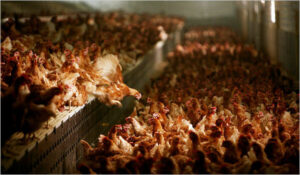
It’s 2021 and perhaps the large number of egg options is confusing you. Maybe you are in the grocery store RIGHT NOW looking for the answer to this question: In the US, what is the difference between organic, free range, cage-free, certified humane, and pastured eggs? Rest assured, my friend, I have created a cheat sheet below to answer this very question:
Commercial egg farming involves holding several hundred or thousand laying hens in dark barns. Many times, these birds are caged to limit movement completely and force them to reliably lay eggs on a conveyor belt. The roosters are gassed to death because they don’t lay eggs, and the hens are debeaked and caged. The hens are so mentally deranged by their treatment, that if farmers did not debeak them, they might injure or kill themselves.

In addition to the obvious moral qualms, commercial egg production leads to a less healthy / tasty egg, and also leads to run off problems that cause water contamination and algae blooms in places such as the Chesapeake Bay. A report from 2016-2020 found that 84% of chicken farms in Maryland violated the law in regard the amount of runoff from their properties. 46% were still violating the rule several months later. Only 4% of those companies were penalized, and only 2% were fined. The statistics are staggering, and the 20 page report cannot be summarized in a few sentences.
Additionally, chickens are routinely fed antibiotics as part of their diet, not in response to infection. There are concerns these antibiotics end up in our food, as well as concerns of increased microbial resistance.
So, what do the labels mean!? As of 2021, here’s what the labels on egg cartons mean:
Cage-Free: Cage-free means the chicken is free to move around, but still kept in a cramped, dark barn with no access to the outdoors. These chickens are still fed antibiotics and debeaked. No roost or dust bath space is required. 
Certified Humane: Chickens are cage-free, have access to dirt to take dust baths, and have space to roost at night. Chickens cannot be starved to induce molting.
Free Range: Birds are cage free and are provided outdoor space. However, this outdoor space is frequently only a few square feet. The outdoor space can be on concrete or it can be a patch of dirt. The outdoor space does not have to be obviously accessible to the hens or provide a space for them to forage.
Organic: Everything listed in Free Range and Cage Free plus a diet that is non-GMO and no unnecessary antibiotic usage. Lots of times, eggs certified organic will also have the humane sticker on the carton.
Pastured: These are the real deal, although this term is not regulated by the USDA and thus, many brands do not use it. Pastured hens are outside foraging as part of a healthy ecosystem. These ‘pastured’ eggs are the ones we buy from local farmers or are sometimes available at local small markets like MOMs. Small farms solve the run off problem, the antibiotic problem, and the other moral qualms of commercial egg production.
These are the standards for eggs as they are written on the labels. When it comes to eggs (and chicken and meat production in general in the US) words like “organic” and “free-range” have been diluted and wielded by morally bankrupt companies such as Cal-Maine, Rose Acre Farms, and Herbruck Poultry, to intentionally confuse people. In 2016, these companies actively fought what was called the “OLPP” rule (Organic Livestock and Poultry Practices) to call their eggs “organic” and “free-range,” despite the fact that they have no access to pasture. In 2017, a Consumer Report noted that 83% of organic consumers found it “extremely” important that eggs labeled organic come from hens that have access to pasture.

Is there any hope?
Yes! Some brands, such as Nellie’s, Pete and Gerry’s, Happy Eggs, and others are starting a movement in the US towards moral treatment of animals. They may only have “free range”, “organic”, or “certified humane” on their labels, but their standards are actually much higher as their hens actually forage in the outdoors. These eggs are mainstream now- they can be found at most supermarkets. I love this video that Pete and Gerry’s has on their website.
Also, always remember to support your local, small farmers!

